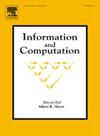Decision problems for systems of language equations and inequations
IF 1
4区 计算机科学
Q3 COMPUTER SCIENCE, THEORY & METHODS
引用次数: 0
Abstract
Systems of language equations and inequations are studied, where φ and ψ may contain Boolean operations and concatenation. It is proved that the problem whether such a system has a solution is -complete in the arithmetical hierarchy (cf. the earlier studied case of equations only, where it is co-r.e.-complete), the problem whether it has a unique solution is in , and is both -hard and -hard, existence of a finite or regular solution is an r.e.-complete problem, while testing whether a system has finitely many solutions is -complete. Furthermore, it is shown that the class of languages representable by unique solutions of such systems is exactly the class of recursive sets, but decision procedures for the set cannot be algorithmically constructed out of a system. All results hold already for equations over a unary alphabet.
语言方程和不等式系统的决策问题
研究了语言方程φ(X1,…,Xn)=ψ(X1,…,Xn)和不等式φ(X1,…,Xn)≠ψ(X1,…,Xn)的系统,其中φ和ψ可以包含布尔运算和串接。证明了这样一个系统是否有解的问题在算术层次上是Σ20-complete(参见前面只研究方程的情况),其中它是共同的。-完备),它是否有唯一解的问题在Σ30∩Π30,并且同时是Σ20-hard和Π20-hard,有限解或正则解的存在性是一个正则完备问题,而测试一个系统是否有有限多个解是Σ30-complete。进一步证明了可由这类系统的唯一解表示的语言类正是递归集的类,但递归集的决策过程不能从系统中算法构造出来。对于一元字母表上的方程,所有的结果都成立。
本文章由计算机程序翻译,如有差异,请以英文原文为准。
求助全文
约1分钟内获得全文
求助全文
来源期刊

Information and Computation
工程技术-计算机:理论方法
CiteScore
2.30
自引率
0.00%
发文量
119
审稿时长
140 days
期刊介绍:
Information and Computation welcomes original papers in all areas of theoretical computer science and computational applications of information theory. Survey articles of exceptional quality will also be considered. Particularly welcome are papers contributing new results in active theoretical areas such as
-Biological computation and computational biology-
Computational complexity-
Computer theorem-proving-
Concurrency and distributed process theory-
Cryptographic theory-
Data base theory-
Decision problems in logic-
Design and analysis of algorithms-
Discrete optimization and mathematical programming-
Inductive inference and learning theory-
Logic & constraint programming-
Program verification & model checking-
Probabilistic & Quantum computation-
Semantics of programming languages-
Symbolic computation, lambda calculus, and rewriting systems-
Types and typechecking
 求助内容:
求助内容: 应助结果提醒方式:
应助结果提醒方式:


